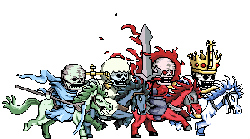RE: Is the Atheism/Theism belief/disbelief a false dichotomy? are there other options?
October 2, 2015 at 5:53 am
One thing I can be as close to certain about as possible, is that any "God" character will be so unlike any of the cartoon characters portrayed in religion as to be unrecognisable. These are just obviously super-human projections and nothing more.
A real "God" is most reasonably likely to be a computer programmer. Failing that, some deistic God which set things in motion and is now disinterested or at least non-active. The idea that it is judging us and is going to give us an afterlife based on some weird criteria it is unable to communicate properly is about as absurd as can be.
Put simply: if God is a "good guy" then he would be happy with you living your life in the best way you can. If he's a "bad guy" then he can't be trusted to stick to his word, even if we had it. Nor does he deserve worship. But we don't have his word, we have people making up stories. Look at it from "God"s point of view, running the whole universe. How much importance to you think we would represent to him?
If God is outside our reality, then we probably will never be able to make any kind of contact. If it doesn't interact, it is irrelevant. There is no evidence it interacts. If it is actually holding reality together constantly through its will, then big deal. We can say "thank you" and that should be enough. Any being that demands constant adoration, worship and begging on the floor is an all-too-human egotistical projection. Not a god. If it's all powerful, it expended literally no effort to make our reality.
Back to knowing: I'm not quite sure what you mean here. I was saying we can each individually claim to "know" things, about ourselves or the world around us. That in no way makes them true, it's simply a claim. It's actually worthless to anyone but ourselves, and if we don't question what we think we know regularly, it's dangerous even to ourself. The way we as a species try and develop real knowledge is to pool what we think we know, and try and provide evidence. Those things that people can agree has enough evidence, and can be modelled in a satisfactory way, we can tentatively consider knowledge. Those things that have not been evidenced, or cannot even be tested, cannot be considered knowledge.
Some mad person can "know" I'm a demon. They can be 100% sure. That has no impact on whether I'm a demon, or if there is even such a thing as a demon. For it to become meaningful knowledge, we'd have to define demon, and then find a realiable way of testing to see who is and isn't.
A real "God" is most reasonably likely to be a computer programmer. Failing that, some deistic God which set things in motion and is now disinterested or at least non-active. The idea that it is judging us and is going to give us an afterlife based on some weird criteria it is unable to communicate properly is about as absurd as can be.
Put simply: if God is a "good guy" then he would be happy with you living your life in the best way you can. If he's a "bad guy" then he can't be trusted to stick to his word, even if we had it. Nor does he deserve worship. But we don't have his word, we have people making up stories. Look at it from "God"s point of view, running the whole universe. How much importance to you think we would represent to him?
If God is outside our reality, then we probably will never be able to make any kind of contact. If it doesn't interact, it is irrelevant. There is no evidence it interacts. If it is actually holding reality together constantly through its will, then big deal. We can say "thank you" and that should be enough. Any being that demands constant adoration, worship and begging on the floor is an all-too-human egotistical projection. Not a god. If it's all powerful, it expended literally no effort to make our reality.
Back to knowing: I'm not quite sure what you mean here. I was saying we can each individually claim to "know" things, about ourselves or the world around us. That in no way makes them true, it's simply a claim. It's actually worthless to anyone but ourselves, and if we don't question what we think we know regularly, it's dangerous even to ourself. The way we as a species try and develop real knowledge is to pool what we think we know, and try and provide evidence. Those things that people can agree has enough evidence, and can be modelled in a satisfactory way, we can tentatively consider knowledge. Those things that have not been evidenced, or cannot even be tested, cannot be considered knowledge.
Some mad person can "know" I'm a demon. They can be 100% sure. That has no impact on whether I'm a demon, or if there is even such a thing as a demon. For it to become meaningful knowledge, we'd have to define demon, and then find a realiable way of testing to see who is and isn't.
Feel free to send me a private message.
Please visit my website here! It's got lots of information about atheism/theism and support for new atheists.
Index of useful threads and discussions
Index of my best videos
Quickstart guide to the forum
Please visit my website here! It's got lots of information about atheism/theism and support for new atheists.
Index of useful threads and discussions
Index of my best videos
Quickstart guide to the forum









